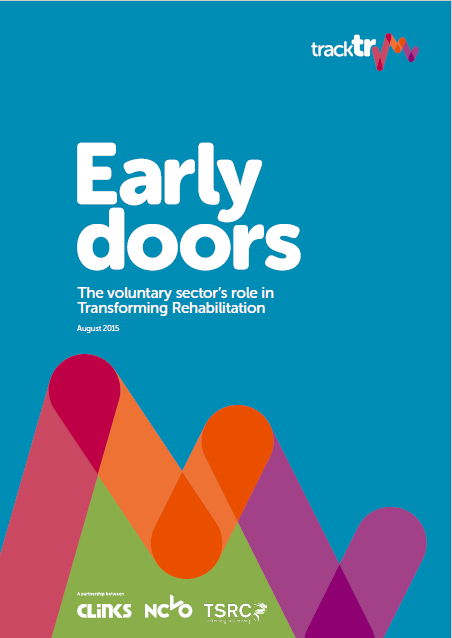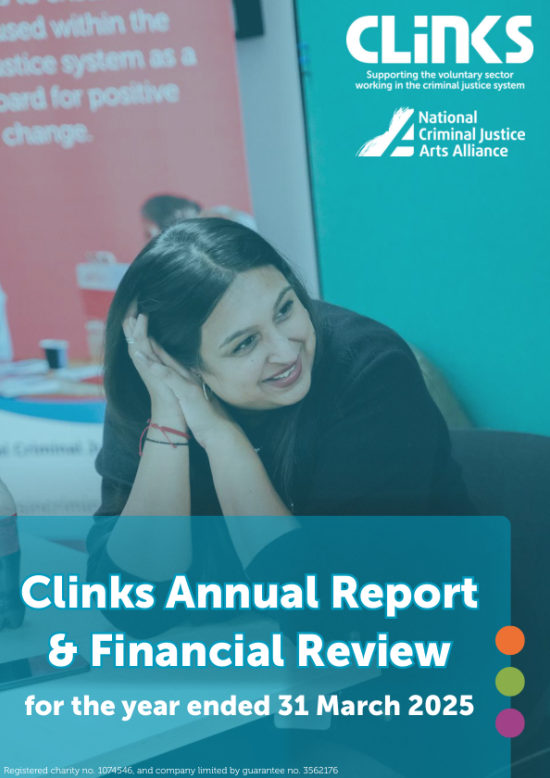 We know that the voluntary sector is central to the genuine transformation of rehabilitation and resettlement services, and although it is early doors, we have heard clear warning signals that many organisations remain on the side-lines, and others are fundamentally questioning their sustainability. Today we have launched the first #trackTR report, led by Clinks in partnership with NCVO and TRSC it provides a glimpse into the reality on the ground as told by charities working in the criminal justice sector.
We know that the voluntary sector is central to the genuine transformation of rehabilitation and resettlement services, and although it is early doors, we have heard clear warning signals that many organisations remain on the side-lines, and others are fundamentally questioning their sustainability. Today we have launched the first #trackTR report, led by Clinks in partnership with NCVO and TRSC it provides a glimpse into the reality on the ground as told by charities working in the criminal justice sector.
156 voluntary sector organisations responded to our survey to give their views on the landmark Transforming Rehabilitation reforms that promised to put the sector “at the frontline of offender rehabilitation”. The sector is telling a story of being left in a state of limbo by a slow pace of change, cuts to funding, a lack of transparency, and apprehension amongst funders and commissioners. But others tell a different story, one where new contracts are won, with organisations getting ready to deliver and expanding their work with people in the Criminal Justice System.
A state of limbo
The transformation of probation has been slower than many in the voluntary sector were led to believe. Many are still waiting to see how or if they will be involved in service delivery beyond the next few months, making strategic planning and staff retention difficult. The few voluntary sector organisations that are managing to firm up new service delivery contracts are confined to our larger members with a national, or multi-regional footprint.
“The extent of delays in mobilisation… were not anticipated and this is now having a serious impact on our planning, budget/finances and managing our partners.” - Survey respondent
It is worth noting that the pace of change has been breakneck, and that the expected timescales for the implementation of new services have been much shorter than many would have liked, doubtless including many of the new owners of Community Rehabilitation Companies (CRC) and the National Probation Service (NPS) who have both had to ensure that existing services are maintained whilst the re-structuring of the probation services continues. This will have had an impact on their collective capacity to focus on an approach that engages the widest range of voluntary sector delivery partners.
So the pace of change has brought challenges to all sides, however, it appears to be having the worst impact on those who have the least capacity to sustain themselves during this time - the smaller organisations that provide local (often specialist) support. It is unclear when, or if, these voluntary sector providers will find a place in the delivery model of CRCs in the months and years ahead. And by the time that does become clear many of these organisations may have had to close their doors.
A lack of transparency
There is little clarity on the role that charities will be playing in new probation contracts; we simply don’t have the detail yet. We don’t know what services the voluntary sector will be delivering, or how they will be resourced to do it.
“Core funding for our Female Offender services expired at the end of March 2015… some of this has been extended by 3 months but we have not got any assurance of continuity thereafter”. - Survey respondent
The lack of clarity makes it difficult to understand the role of the voluntary sector in the new reality, so we will continue to call for greater transparency around the value and quantity of work that gets sub-contracted to the voluntary sector. However, that isn’t our only concern, we have to interrogate what the voluntary sector is being asked to provide, whether it represents real quality, if it makes the best use of the assets and expertise of specialist organisations. Ultimately we should base our judgement of Transforming Rehabilitation on whether it is making a difference to the people who need better rehabilitation and resettlement services, their families, and the communities they return to.
As we continue to monitor the impact of Transforming Rehabilitation we will start to focus in on the delivery of specialist services. For example, we will explore what is happening to women-specific approaches, what is being done to address the disproportionate over-representation of Black, Asian and minority ethnic offenders, how the distinct needs of young adults will be met, what is being done to support care leavers, or whether the needs of an ageing prison population have been considered.
Apprehension amongst funders and commissioners
The voluntary sector report a sense of apprehension amongst funders and commissioners about what new probation providers will fund (both Community Rehabilitation Companies & the National Probation Service). They report that some independent charitable funders and local commissioners are questioning whether they should continue to fund charities that work with offenders. Additionally commissioners appear to be cutting funding for some offender rehabilitation and resettlement services, especially in areas such as housing.
“We have had grant funding come to an end with the funder assuming that Transforming Rehabilitation contracts would replace this and/or not being comfortable funding work with charitable donations that could potentially deliver profit to private companies. We have also had prisons reluctant to commission work due to being uncertain whether it would be their or the Community Rehabilitation Company’s responsibility to do so.” – Survey respondent
This is making life all the more complicated for a range of voluntary sector organisations, both large and small. Not only does it affect their ability to plan their fundraising strategy, but it is also impacting on local relationships between the voluntary sector and other commissioners and funders. This issue, combined with the slower than expected mobilisation and the lack of transparency is causing widespread confusion amongst both providers and commissioners about who is (or should be) paying for what.
“Services previously funded by the local authority have been decommissioned as there is an expectation that Community Rehabilitation Companies will pick them up. This is particularly true in the case of housing. In reality this has not happened.” – Survey respondent
In the background to all of these funding decisions are the pre-existing cuts to the Ministry of Justice budget, which stands at a 24% budget reduction over the last five years (totalling £893 million). As part of the forthcoming 'spending review' the Ministry of Justice is being asked to make a further reduction of between 25% and 40%.
With cuts across other government departments such as health and welfare, as well as to local authorities, it is likely that services will come under more pressure in years ahead. This will doubtless mean that independent charitable trusts and foundations, who fund such a large proportion of the work done by the voluntary sector in criminal justice, will have to give careful consideration as to where and what they want to fund.
Next steps
We are launching a follow-up survey today – click here to start the survey. You can also provide instant feedback on the impact of Transforming Rehabilitation by emailing TRtracking@clinks.org or replying to this blog using the comments below. If you use twitter then you can join the conversation by using the #trackTR hashtag.
What's new
Blogs
Anne Fox CEO of Clinks to stand down after a decade of service
Latest on X
The role is for a leader from an organisation focused on racially minoritised people, with expertise in service delivery, policy, advocacy, or related areas in criminal justice. Racial disparities are present at every CJS stage. This role ensures these voices are central in shaping policy to help address and eradicate them. Apply by Mon 18 Nov, 10am. More info: https://www.clinks.org/voluntary-community-sector/vacancies/15566 #CriminalJustice #RR3 #RacialEquity

